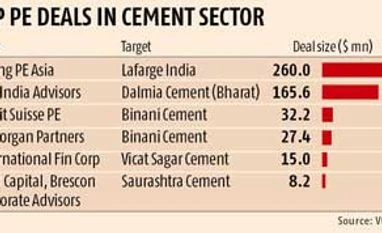Cement companies in India, which are on an expansion spree, have found a helping hand in private equity (PE) firms for funding their business plans. In the last couple of months, the industry has witnessed high demand for PE funding.
In one of the largest PE deals this year, Baring Private Equity Asia has invested about $260 million (Rs 1,440 crore today) in Lafarge India for a 14 per cent stake in the cement firm. The funding from Baring Asia will be used to double Lafarge India’s capacity at its Chhattisgarh plant.
Another company that is in discussion for fund-raising is Heidelberg Cement India, a subsidiary of German multinational Heidelberg Cement. According to reports, Bain Capital is conducting a due diligence to pick about 10 per cent in Heidelberg Cement India.
Ravi Shankar, managing director, UBS India, said: “Typically, MNCs (multinational corporations) like to fund the growth capital of subsidiaries themselves, thus avoiding reporting to and involvement of external parties.
However, we are currently seeing a situation where most of the global cement majors are stretched financially due to general slowdown in European market, while Indian cement markets continue to see growth, albeit slower than two years back.
To avoid erosion in market share, Indian units of MNCs need to invest and PE financing comes handy.”
Lafarge India’s parent company, Lafarge SA, is a case in point. The company, which has been struggling to reduce its debt of ^12.2 billion ($16 billion), is unable to fund the expansion of its subsidiary in India, leading the unit to raise money through equity dilution.
India’s cement sector is the world’s second largest after China, with an overall capacity of 350 million tonnes (mt) per annum. Currently, the industry is facing problem due to poor cement demand, amid lack of infrastructure and construction activities.
UltraTech, ACC, Ambuja Cements, Jaiprakash and Shree Cement control almost half the country’s cement market.
In the 11th five-year Plan (2007-12), the industry added 120 mt of new capacities.
Daljeet Kohli, head of Research at IndiaNivesh Securities, said: “Generally, private equity firms invest for a period of five-seven years. India’s cement industry will face a tough time for the next one-two years but with a long-term perspective, the industry will certainly do better.
Ours is an emerging economy and the cement sector grows 1.5 times of GDP (gross domestic product) growth.
With a long-term view, these PE deals look good as currently valuations are very fair at around $130 (enterprise value per tonne).”
UltraTech Cement plans to take its capacity to 75 mt in five years. Swiss major Holcim’s Indian group of companies—ACC and Ambuja— have expansion plans in a phased manner till 2015.
In one of the largest PE deals this year, Baring Private Equity Asia has invested about $260 million (Rs 1,440 crore today) in Lafarge India for a 14 per cent stake in the cement firm. The funding from Baring Asia will be used to double Lafarge India’s capacity at its Chhattisgarh plant.
Another company that is in discussion for fund-raising is Heidelberg Cement India, a subsidiary of German multinational Heidelberg Cement. According to reports, Bain Capital is conducting a due diligence to pick about 10 per cent in Heidelberg Cement India.
Ravi Shankar, managing director, UBS India, said: “Typically, MNCs (multinational corporations) like to fund the growth capital of subsidiaries themselves, thus avoiding reporting to and involvement of external parties.
However, we are currently seeing a situation where most of the global cement majors are stretched financially due to general slowdown in European market, while Indian cement markets continue to see growth, albeit slower than two years back.
To avoid erosion in market share, Indian units of MNCs need to invest and PE financing comes handy.”
Lafarge India’s parent company, Lafarge SA, is a case in point. The company, which has been struggling to reduce its debt of ^12.2 billion ($16 billion), is unable to fund the expansion of its subsidiary in India, leading the unit to raise money through equity dilution.
India’s cement sector is the world’s second largest after China, with an overall capacity of 350 million tonnes (mt) per annum. Currently, the industry is facing problem due to poor cement demand, amid lack of infrastructure and construction activities.
UltraTech, ACC, Ambuja Cements, Jaiprakash and Shree Cement control almost half the country’s cement market.
In the 11th five-year Plan (2007-12), the industry added 120 mt of new capacities.
Daljeet Kohli, head of Research at IndiaNivesh Securities, said: “Generally, private equity firms invest for a period of five-seven years. India’s cement industry will face a tough time for the next one-two years but with a long-term perspective, the industry will certainly do better.
Ours is an emerging economy and the cement sector grows 1.5 times of GDP (gross domestic product) growth.
With a long-term view, these PE deals look good as currently valuations are very fair at around $130 (enterprise value per tonne).”
UltraTech Cement plans to take its capacity to 75 mt in five years. Swiss major Holcim’s Indian group of companies—ACC and Ambuja— have expansion plans in a phased manner till 2015.
)